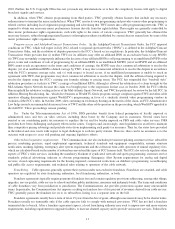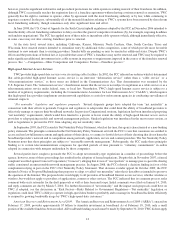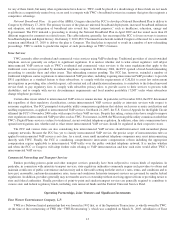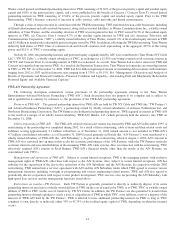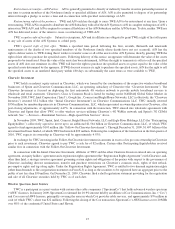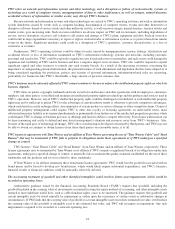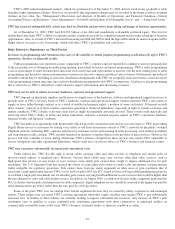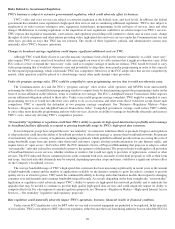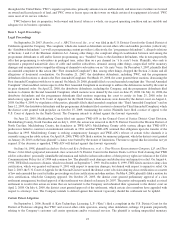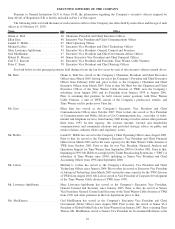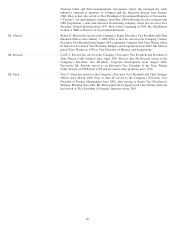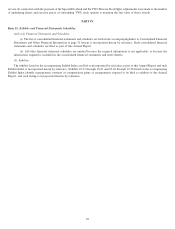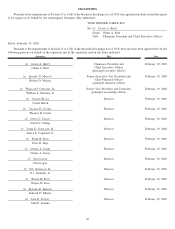Time Warner Cable 2009 Annual Report Download - page 32
Download and view the complete annual report
Please find page 32 of the 2009 Time Warner Cable annual report below. You can navigate through the pages in the report by either clicking on the pages listed below, or by using the keyword search tool below to find specific information within the annual report.Risks Related to Government Regulation
TWC’s business is subject to extensive governmental regulation, which could adversely affect its business.
TWC’s video and voice services are subject to extensive regulation at the federal, state, and local levels. In addition, the federal
government has extended some regulation to high-speed data services and is considering additional regulations. TWC is also subject to
regulation of its video services relating to rates, equipment, technologies, programming, levels and types of services, taxes and other
charges. Modification to existing regulations or the imposition of new regulations could have an adverse impact on TWC’s services.
TWC expects that legislative enactments, court actions, and regulatory proceedings will continue to clarify and, in some cases, change
the rights of cable companies and other entities providing video, high-speed data and voice services under the Communications Act and
other laws, possibly in ways that TWC has not foreseen. The results of these legislative, judicial, and administrative actions may
materially affect TWC’s business operations.
Changes in broadcast carriage regulations could impose significant additional costs on TWC.
Although TWC would likely choose to carry the majority of primary feeds of full power stations voluntarily, so-called “must carry”
rules require TWC to carry some local broadcast television signals on some of its cable systems that it might not otherwise carry. If the
FCC seeks to revise or expand the “must carry” rules, such as to require carriage of multicast streams, TWC would be forced to carry
video programming that it would not otherwise carry and potentially to drop other, more popular programming in order to free capacity
for the required programming, which could make TWC less competitive. Moreover, if the FCC adopts rules that are not competitively
neutral, cable operators could be placed at a disadvantage versus other multi-channel video providers.
Under the program carriage rules, TWC could be compelled to carry programming services that it would not otherwise carry.
The Communications Act and the FCC’s “program carriage” rules restrict cable operators and MVPDs from unreasonably
restraining the ability of an unaffiliated programming vendor to compete fairly by discriminating against the programming vendor on the
basis of its non-affiliation in the selection, terms or conditions for carriage. The FCC’s Adelphia/Comcast Transactions Order imposes
certain additional obligations related to these rules. Under a successful program carriage complaint, TWC might be compelled to carry
programming services it would not otherwise carry and/or to do so on economic and other terms that it would not accept absent such
compulsion. TWC is currently the defendant in two program carriage complaints. See “Business—Regulatory Matters—Video
Services—Program access and Adelphia/Comcast Transactions Order.” Compelled government carriage could reduce TWC’s ability
to carry other, more desirable programming and non-video services, decrease its ability to manage its bandwidth efficiently and increase
TWC’s costs, adversely affecting TWC’s competitive position.
“Net neutrality” legislation or regulation could limit TWC’s ability to operate its high-speed data business profitably and to manage
its broadband facilities efficiently to respond to growing bandwidth usage by TWC’s high-speed data customers.
Several disparate groups have adopted the term “net neutrality” in connection with their efforts to persuade Congress and regulators
to adopt rules that could limit the ability of broadband providers to effectively manage or operate their broadband networks. Proponents
of net neutrality advocate a variety of regulations, including regulations which prohibit broadband providers from recovering the costs of
rising bandwidth usage from any parties other than retail customers; require absolute nondiscrimination for any Internet traffic; and
require forms of “open access.” In October 2009, the FCC initiated a Notice of Proposed Rulemaking that proposes to adopt so-called
“net neutrality” rules that it describes as intended to preserve the openness of the Internet. The proposed rules would apply to all providers
of broadband Internet access services, whether wireline or wireless, but would not apply to providers of applications, content or other
services. The FCC indicated that its comment process seeks comment both on its rationales for the draft proposals as well as their form
and scope. Any final rules that ultimately may be adopted, depending upon their scope and terms, could have a significant adverse effect
on the Company’s broadband services.
The average bandwidth usage of TWC’s high-speed data customers has been increasing significantly in recent years as the amount
of high-bandwidth content and the number of applications available on the Internet continue to grow. In order to continue to provide
quality service at attractive prices, TWC needs the continued flexibility to develop and refine business models that respond to changing
consumer uses and demands and to manage bandwidth usage efficiently. As a result, depending on the form it might take, “net neutrality”
legislation or regulation could adversely impact TWC’s ability to operate its high-speed data network profitably and to undertake the
upgrades that may be needed to continue to provide high quality high-speed data services and could negatively impact its ability to
compete effectively. For a description of current regulatory proposals, see “Business—Regulatory Matters—High-speed Internet Access
Services—‘Net neutrality’ legislative and regulatory proposals.”
Rate regulation could materially adversely impact TWC’s operations, business, financial results or financial condition.
Under current FCC regulations, rates for BST video service and associated equipment are permitted to be regulated. In the majority
of its localities, TWC is not subject to BST video rate regulation, either because the local franchising authority has not asked the FCC for
20



